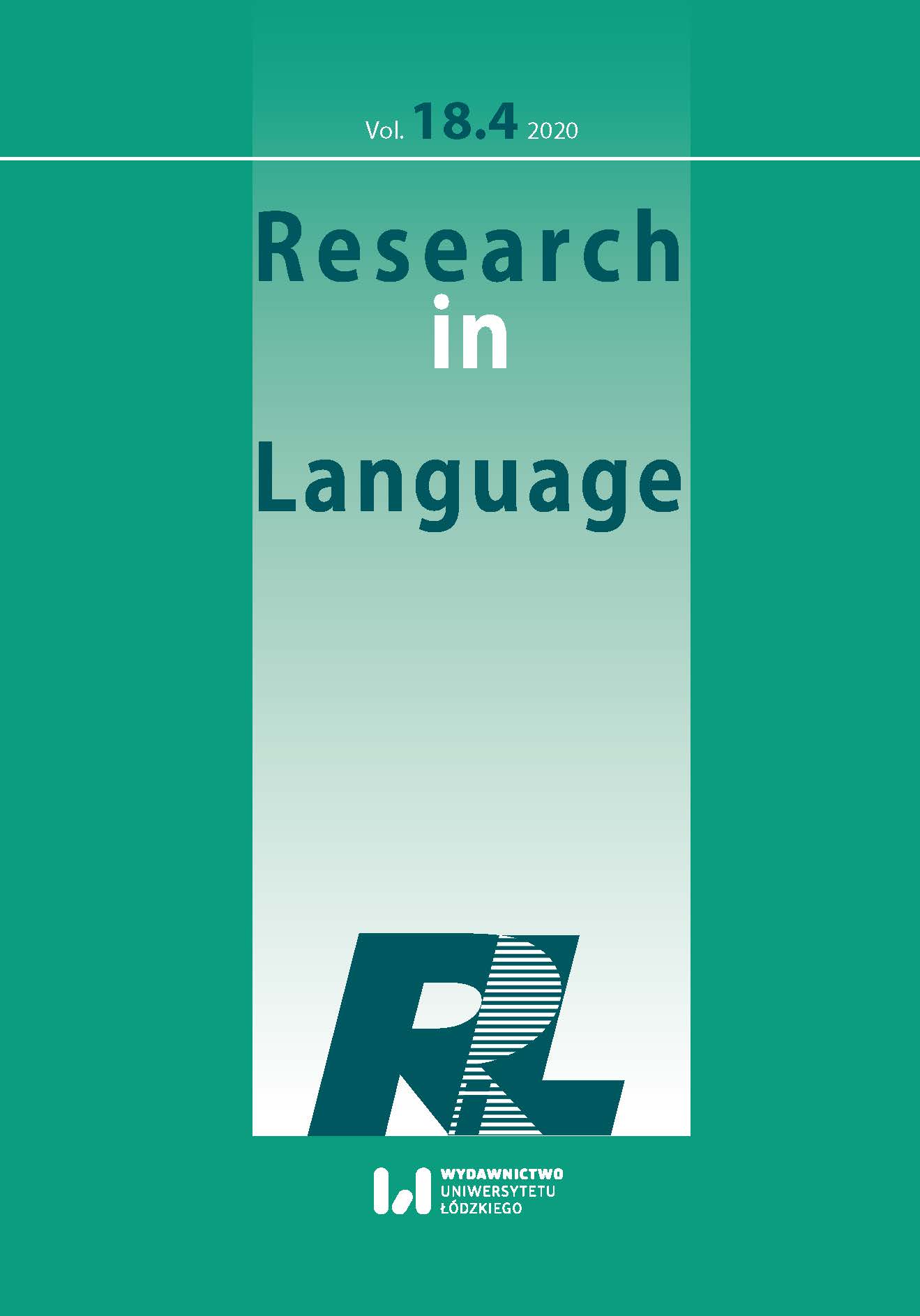An Analysis of Identity Construction in Interactional Narratives by Women with Turner Syndrome
DOI:
https://doi.org/10.18778/1731-7533.18.4.04Keywords:
identity, interview, narrative, positioning, Turner syndromeAbstract
The study aims to uncover and explore the social identities of women suffering from a genetic disorder called Turner syndrome (TS), and whose main symptoms are a short stature and gonadal dysgenesis. Such a genetically-determined physical appearance is argued to influence the positioning of TS women in the web of social relationships and identities. This linguistic analysis of narratives delivered by Polish women with TS in semi-structured interviews aims to explicate the extent to which they are actors or recipients in creating their own identities. The analysis draws on the assumptions of the ‘small story’ paradigm developed by Michael Bamberg (1997, 2005) who claims that in interaction, narrative is not only used to convey meaning, but also to construct the identities of the interlocutors. Thus, narrative is treated in a functional way, in which its formal structure and content are integrally associated with its use and any deviations are relativized as a consequence of a user’s deliberate activity.
References
Al-Bundawi, Zayneb. 2019. Place-attachment as a master narrative in the interviews of Shi’i Muslim Women in the diaspora. In Kamila Ciepiela (ed.), Language, identity, community, 41-52. Frankfurt-am-Main: Peter Lang.
Google Scholar
Bamberg, Michael. 2005. Narrative discourse and identities. In Jan, Christoph Meister, Tom Kindt, Wilhelm Schernus. (eds.), Narratology beyond literary criticism. mediality, disciplinarity, 213-237. Berlin, New York: Walter de Gruyter. https://doi.org/10.1515/9783110201840.213
Google Scholar
DOI: https://doi.org/10.1515/9783110201840.213
Bamberg, Michael. 1997. Positioning between Structure and Performance. Journal of Narrative and Life History, 7 (1–4), 335–342. https://doi.org/10.1075/jnlh.7.42pos
Google Scholar
DOI: https://doi.org/10.1075/jnlh.7.42pos
Bamberg, Michael, Anna De Fina, and Deborah Schiffrin. 2011. Discursive perspectives on identity construction. In Seth Schwartz, Koen Luyckx, and Vivian Vignoles (eds.), Handbook of identity theory and research, vol.1, 177-199. Berlin/New York: Springer Verlag. https://doi.org/10.1007/978-1-4419-7988-9_8
Google Scholar
DOI: https://doi.org/10.1007/978-1-4419-7988-9_8
Bamberg, Michael, and Alexandra Georgakopoulou. 2008. Small stories as a new perspective in narrative and identity analysis. Text and Talk, 28(3), 377–396. https://doi.org/10.1515/TEXT.2008.018
Google Scholar
DOI: https://doi.org/10.1515/TEXT.2008.018
Bell, Susan, E. 2006. Becoming mother after DES: intensive mothering in spite of it all. In Anna de Fina, Deborah Schiffrin, and Michel Bamberg. (eds.) Discourse and identity, 233-252. Cambridge: Cambridge University Press. https://doi.org/10.1017/CBO9780511584459.012
Google Scholar
DOI: https://doi.org/10.1017/CBO9780511584459.012
Chafe, Wallace. 1990. Some things that narrative tells us about the mind. In Bruce, K. Britton, and Anthony, D. Pellegrini. (eds.) Narrative thought and narrative language, 79-98. Hillsdale, NY: Erlbaum.
Google Scholar
Cortina, Mauricio, and Giovanni Liotti. 2010. Attachment is about safety and protection, intersubjectivity is about sharing and social understanding: The relationships between attachment and intersubjectivity. Psychoanalytic Psychology, 27(4), 410–441. https://doi.org/10.1037/a0019510
Google Scholar
DOI: https://doi.org/10.1037/a0019510
Cragg, Stephanie. J., and Kathryn, D. Lafreniere 2010. Effects of Turner Syndrome on Women’s Self-Esteem and Body Image. Journal of Developmental and Physical Disabilities, 22:433–445. https://doi.org/10.1007/s10882-009-9178-0
Google Scholar
DOI: https://doi.org/10.1007/s10882-009-9178-0
De Fina, Anna. 2013. Positioning level 3: Connecting local identity displays to macro social processes. Narrative Inquiry, 23(1), 40–61. https://doi.org/10.1075/ni.23.1.03de
Google Scholar
DOI: https://doi.org/10.1075/ni.23.1.03de
Durkheim, Emile. 1966 [1895]. The rules of sociological method. New York: Free Press.
Google Scholar
Fludernik, Monika. 2009. An introduction to narratology. (transl. Patricia Häusler-Greenfield & Monika Fludernik). New York: Routledge. https://doi.org/10.4324/9780203882887
Google Scholar
DOI: https://doi.org/10.4324/9780203882887
Freeman, Mark. 2001. From substance to story: narrative, identity and the reconstruction of the self. In J. Brockmeier and D. Carbaugh (eds.), Narrative and identity: studies in autobiography, self and culture, 283-298. Amsterdam and Philadelphia: John Benjamins. https://doi.org/10.1075/sin.1.16fre
Google Scholar
DOI: https://doi.org/10.1075/sin.1.16fre
Hutaff-Lee Christa, Elizabeth Bennett, Susan Howell, and Nicole Tartaglia. 2019. Clinical developmental, neuropsychological, and social–emotional features of Turner syndrome, American Journal of Medical Genetics, 181C: 42–50. Available from: https://doi.org/10.1002/ajmg.c.31687 [Accessed: 25th January 2020].
Google Scholar
DOI: https://doi.org/10.1002/ajmg.c.31687
Jefferson, Gail 2004. Glossary of transcript symbols with an introduction. In G. H. Lerner (ed.), Conversation Analysis: studies from the first generation, 13-31. Amsterdam: John Benjamins. https://doi.org/10.1075/pbns.125.02jef
Google Scholar
DOI: https://doi.org/10.1075/pbns.125.02jef
Mauss, Marcel. 1967. The gift. New York: Norton.
Google Scholar
Mead, George 1934. Mind, self, society. Chicago: University of Chicago Press.
Google Scholar
Rieser, Patricia, and Marsha Davenport. 2019. Turner Syndrome: a guide for families. Available from: http://www.turnersyndrome.org/dmdocuments/TSfamily_guide092502B.pdf [Accessed: 25th January 2020].
Google Scholar
Riessman, Catherine, Kohler. 2002. Analysis of personal narratives. In Jaber, F. Gubrium and James, A. Holstein (eds.) Handbook of interview research, 695-710. Thousand Oaks: Sage. https://doi.org/10.4135/9781412973588.n40
Google Scholar
DOI: https://doi.org/10.4135/9781412973588.n40
Schiffrin, Deborah 1996. Narrative as self-portrait: Sociolinguistic constructions of identity. Language in Society, 25, 167-203. https://doi.org/10.1017/S0047404500020601
Google Scholar
DOI: https://doi.org/10.1017/S0047404500020601
Schiffrin, Deborah. 2000. Mother/daughter discourse in Holocaust oral history. Narrative Inquiry, 10(1), 1-44. https://doi.org/10.1075/ni.10.1.01sch
Google Scholar
DOI: https://doi.org/10.1075/ni.10.1.01sch
Schiffrin, Deborah. 2006. From linguistic reference to social reality. In Anna de Fina, Deborah Schiffrin, & Michael Bamberg (eds.), Discourse and identity, 103-131. Cambridge: Cambridge University Press. https://doi.org/10.1017/CBO9780511584459.006
Google Scholar
DOI: https://doi.org/10.1017/CBO9780511584459.006
Schnurr, Stephanie., Dorien Van De Mieroop, and Olga Zayts. 2014. Positioning oneself in relation to larger collectivities in expatriates’ workplace narratives. Narrative Inquiry 24(2), 386–407. https://doi.org/10.1075/ni.24.2.11sch
Google Scholar
DOI: https://doi.org/10.1075/ni.24.2.11sch
Świątkiewicz–Mośny, Maria. 2010. Tożsamość napiętnowana. Socjologiczne stadium mechanizmów stygmatyzacji i autostygmatyzacji na przykładzie kobiet z zespołem Turnera. Kraków: Nomos.
Google Scholar
Toft, Daniel, J., and Kelly, M. Rehan. 2014. Estrogen replacement therapy for Turner syndrome hormones for healthy female sex development. Available from: https://www.endocrineweb.com/conditions/turner-syndrome/estrogen-replacement-therapy-turner-syndrome [Accessed: 30th January 2020].
Google Scholar
Tomasello, Michael. 2001. The cultural origins of human cognition. Cambridge, MA: Harvard University Press.
Google Scholar
DOI: https://doi.org/10.4159/9780674044371
Zadrożna, Ilona. 2013. Social functioning of women with Turner syndrome research results & discussion, Interdyscyplinarne Konteksty Pedagogiki Specjalnej, 1, 121-137. https://doi.org/10.14746/ikps.2013.1.07
Google Scholar
DOI: https://doi.org/10.14746/ikps.2013.1.07
Downloads
Published
How to Cite
Issue
Section
License

This work is licensed under a Creative Commons Attribution-NonCommercial-NoDerivatives 4.0 International License.










